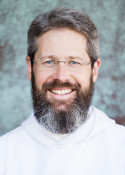FROM THE RECTOR
We Came
In some of the catacombs in Rome there is a simple inscription carved into the walls: We Came. Carved by pilgrims over centuries, this simple phrase stands in for a journey that often stretched for days, weeks, and even months. Depending on the point of departure, the pilgrimage could have been for dozens or hundreds of miles. Often what was most important was that they arrived.
Pilgrimage is an ancient practice, and one that is not particular to the Christian tradition. But it was one that started early on in Christianity, as people made their way to Jerusalem, especially to follow the steps of Christ. (This kind of a pilgrimage is actually the reason why we know about Holy Week in the 4th century, thanks to a pilgrimage diary by Egeria, a Spanish nun.)
Over the centuries, though, the notion of pilgrimage broadened. To some degree because of distance and cost, pilgrim routes were set up all around the Mediterranean. Compostela (the Camino), Lourdes, Rome, Constantinople, and other sites served as destinations of sorts, as Christians looked to deepen their faith through prayer, companionship, and journey.
A few weeks ago, I was fortunate to take part in the St. Francis Pilgrimage in the Cascade mountains of Washington. At first, I wasn’t sure about the “destination” component of the pilgrimage. While St. Francis clearly is a guide and witness for us to God’s presence in Creation, could the Cascades and Holden Village serve as a place of pilgrimage? Was it holy enough? Would it work?
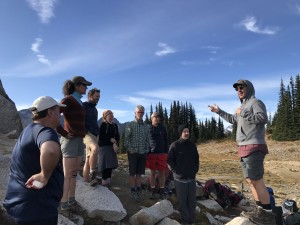 In a word, yes. Profoundly. What I found as we prayed the Daily Office, as we walked in silence, as we carried each other along, as we celebrated the Eucharist on high mountain passes, as we encountered the Divine in wildness all around us, was that the destination is there perhaps simply because without it a pilgrimage would never begin. And that it is in the giving of one’s self over to encountering God on the way—within, in others, in the creatures that you encounter on the path, that the pilgrimage is made. This sense of pilgrimage was articulated most clearly for me by one of our pilgrims, the Rev. Bill Harper (and All Soulsian Blake Harper’s dad), when he shared these words by Mark Nepo,
In a word, yes. Profoundly. What I found as we prayed the Daily Office, as we walked in silence, as we carried each other along, as we celebrated the Eucharist on high mountain passes, as we encountered the Divine in wildness all around us, was that the destination is there perhaps simply because without it a pilgrimage would never begin. And that it is in the giving of one’s self over to encountering God on the way—within, in others, in the creatures that you encounter on the path, that the pilgrimage is made. This sense of pilgrimage was articulated most clearly for me by one of our pilgrims, the Rev. Bill Harper (and All Soulsian Blake Harper’s dad), when he shared these words by Mark Nepo,
“One who journeys without being changed is a nomad. One who changes without going on a journey is a chameleon. One who journeys and is transformed by that journey is a pilgrim.”
These journeys do not have to end in Jerusalem, or at shrines. They can begin, and even end in the most ordinary of places. Travel is helpful, if only to force us look outside as well as within. Companions are good, as they draw out of us what we may not be able to voice on our own. But in the end, we simply need to be open and ready to glimpse the Spirit along the way.
Peace,
Phil+
New Class Beginning
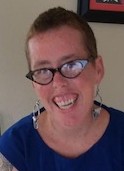 An Unlikely Evangelist
An Unlikely Evangelist
I did not set out to be an evangelist. If I had ever thought I would identify myself that way I would have run screaming from the church immediately. That changed over a period of years in which I discovered evangelism to be something very different than what I had always thought it to be.
I had a friend I’ll call Sarah. We met at a playground. Our kids were throwing sand and we were both very, very tired. We started spending a lot of time together, sitting at my kitchen table with coffee while our children destroyed things. During this time I was in the process of getting baptised and confirmed in the Roman Catholic church. I talked to her a lot about my faith and what it meant to me and what I was finding out. Over the next couple of years I found my way to All Souls, and when I did I shared my joy about that too. I talked about what finding a church home meant to me, what we did, and what it felt like.
Sarah is Jewish. Her family had never been observant. Through our conversations she became inspired to join a synagogue. She became very active. I started to learn from her about her faith and tradition, and in turn my faith grew stronger. At one point she made a commitment to some pretty serious proportional giving. “Oh please don’t do that Sarah.” I said. “I can’t live up to that.” We challenged each other to go deeper, to ask questions, to live out our beliefs.
Sarah never visited All Souls. But I visited her synagogue. I was also privileged to celebrate Chanukah with her family. I was privileged to deepen my faith, my relationship with God, and my connection with another person, and to support someone else in doing the same. And that encapsulates my personal definition of evangelism (I would also include room for connecting with people who are non theists around meaning and purpose in our lives). Sarah will never become a Christian. She will never join All Souls. And I don’t want her to. I proclaimed the Good News to her as I understand it and she heard it. The Spirit works in all kinds of ways.
That’s how I came to call myself an evangelist and to be passionate about encouraging all of us to do the same. Now that I have become comfortable and confident with evangelism, I do also directly invite people to church when I feel that it’s appropriate. I do also share about my faith publicly. And yes, I talk about it at work. But there is room for all of us to develop different understandings of what evangelism means to us and what our personal paths toward becoming evangelists might look like.
If you’re terrified of the “E” word you are not alone. The histories of colonialism and oppression that are tied to that word and that concept are very, very deep. A lot of us hold pain around it. There are problems and pitfalls in trying to pursue it. But if you’re interested in finding ways to make your faith alive in your whole life, not just your time at All Souls on Sunday, come to our evangelism series during the next three formation hour sessions. If you’re interested in connecting with other people around meaning in your lives, come. If you’re interested in sharing with other people about your joy in community, come. If you’re in love with Jesus, please come.
The Evangelism Committee has put together three sessions. We will be in the Common Room on October 22nd, 29th, and November 12th. On the 22nd of October our amazing Associate Rector Liz Tichenor will present, and on the October 29th and November 12th our beloved All Soulsians Scott MacDougall and the Rev. Michael Lemaire will present, respectively. We will have discussion and art (you will not be forced to participate in the art). There will also be snacks and videos.
If you have any questions, I’m at allthepossible@gmail.com or 510.332.0631. I look forward to seeing you there!
– Dani Gabriel
From the Stewardship Team
An Invitation
October is pledge campaign season at All Souls Parish where we think about our pledges for next year. For me it will mark my first anniversary on the stewardship team and my second Ingathering and Celebration Sunday. Having a full parish potluck with games and music is a new stewardship tradition for me, not practiced at my previous parishes in Los Angeles or San Francisco. But it’s a particularly appropriate tradition with this year’s theme: Building Up in Love.
Building Up in Love comes from Ephesians 4:16 where Paul describes the work of the church as building the body of Christ with “each part working properly” to make a whole body in full health.
How does the annual pledge campaign fit into the body? The simple answer is that there are expenses for the building, staff, supplies and more. Another answer is that giving is a discipline like prayer or service that turns our focus away from ourselves and towards God. Yet another answer is that the act of stewardship is the act of building community.
This year the stewardship team and many vestry members read Henri Nouwen’s terrific short book “A Spirituality of Fundraising” that raised my attention to the community building aspect of fundraising. He writes: “If we ask for money it means that we offer a new fellowship…we have something to offer—friendship, prayer, peace, love, fidelity, affection, ministry with those in need—and these things are so valuable that people are willing to make their resources available to sustain them.” What a wonderful description of the gifts we give and receive in our collective investment. We know that not only does what we pledge contribute but that this investment builds on that of generations of faithful people who came before us.
Please join in worship on Celebration Sunday, October 29, when we will hear from the Rev. Chris Craun of St Michael’s and All Angels in Portland and fill out our 2018 pledge cards. And please join the evening celebration at 5:30 by signing up for a table here.
As Mother Liz reminded us in this Sunday’s homily the question to us is how will we respond to the invitation.
– Eric Legrand
CREATING A CULTURE OF PEACE
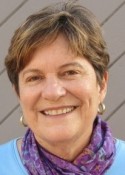 Nonviolence training for personal and social change
Nonviolence training for personal and social change
How can I respond to the violence and chaos in this culture? It is easy to feel helpless and powerless given mass shootings, racism, deepening inequality, the alt-right, environmental destruction, threats to immigrants and so much more. Will I respond violently? Will I remain passive? Or will I again embrace Active Nonviolence (which theologian Walter Wink called Jesus’ Third Way)? As a Christian, a justice and peace activist, and a student of active nonviolence, I am called to choose Jesus’ Third Way!
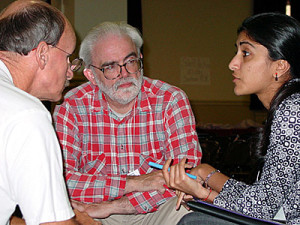 Join me for the Creating a Culture of Peace (CCP) training at All Souls. The innovative design provides a holistic and practical foundation in active nonviolence. Participants come to recognize their own inner power for making personal and social change without using violence. They learn skills for respectful engagement with opponents, instead of relying on confrontation that polarizes and demonizes. They consider two forms: Constructive Nonviolence, to create the just and peaceful alternative culture we desire and Nonviolent Resistance, to protest injustice and oppression and protect the oppressed.
Join me for the Creating a Culture of Peace (CCP) training at All Souls. The innovative design provides a holistic and practical foundation in active nonviolence. Participants come to recognize their own inner power for making personal and social change without using violence. They learn skills for respectful engagement with opponents, instead of relying on confrontation that polarizes and demonizes. They consider two forms: Constructive Nonviolence, to create the just and peaceful alternative culture we desire and Nonviolent Resistance, to protest injustice and oppression and protect the oppressed.
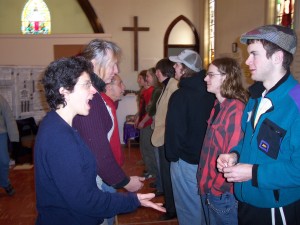 Participants explore the topics of violence and nonviolence, analyze social change and community-building, and then plan concrete action projects. CCP is highly participatory. It utilizes a popular education approach, varied media and small working groups. The facilitator draws out the wisdom, experience and knowledge from participants, and more mutual learning occurs through storytelling, group discussions, brainstorming, role play, movement, a video, thought-provoking exercises and skill-training and practice. The training is an incubator for participants to raise and address issues which they have chosen, such as a group conflict, neighborhood violence, climate change, militarism, police violence, racism, homelessness, or health care. They build a sense of solidarity through meditation and ritual, a shared foundation, new skill sets, and guided experiences in struggling, celebrating and planning together. They begin to discover their own personal and group power to implement nonviolent change.
Participants explore the topics of violence and nonviolence, analyze social change and community-building, and then plan concrete action projects. CCP is highly participatory. It utilizes a popular education approach, varied media and small working groups. The facilitator draws out the wisdom, experience and knowledge from participants, and more mutual learning occurs through storytelling, group discussions, brainstorming, role play, movement, a video, thought-provoking exercises and skill-training and practice. The training is an incubator for participants to raise and address issues which they have chosen, such as a group conflict, neighborhood violence, climate change, militarism, police violence, racism, homelessness, or health care. They build a sense of solidarity through meditation and ritual, a shared foundation, new skill sets, and guided experiences in struggling, celebrating and planning together. They begin to discover their own personal and group power to implement nonviolent change.
(Please know that this is not civil disobedience training. It is deep nonviolence training for everyday living.)
What have other Episcopalians said about the training?
- “This has been the most helpful training event of my career—the most relevant and most inspiring and efficiently presented, at several points exquisite.” The Rev. Beth Turner, NC
- “I felt a graceful, encouraging presence. The integration of many disciplines and traditions into one great song was music for heart and soul.” The Rev. William Exner, NH
As a member of All Souls, I am delighted that the Diocese asked me to offer CCP training. The program continues to teach me about living nonviolently. I developed the curriculum, with the benefit of many teachers, when I served as Executive Director and Training Coordinator at the U.S. Fellowship of Reconciliation and as Chairperson of the National Episcopal Peace Fellowship. We have offered it for parishes, dioceses, seminaries, youth camps and community groups across the country over the past 15 years. Feel free to contact me by email or at 845-641-3648.
– Janet Chisholm
What: Creating a Culture of Peace — nonviolence training for personal & social change
When: Two Saturdays, November 11 + 18, 9am – 6pm each day
Where: All Souls, 2220 Cedar Street, Berkeley
Who: High School Students & Adults – It is intergenerational!
Sponsor: Diocese of California & Episcopal Peace Fellowship/EastBay
Cost: $25 for materials; scholarship available; certificates upon completion
Registration: https://diocal.wufoo.com/forms/z5n4xsu112c7ol/
Contact: The Rev. Eric Metoyer, ericm@diocal.org
Parking this Sunday
Block Party on Spruce!
Our neighbors are having a block party this Sunday, and Spruce will be blocked off between Cedar and Virginia beginning at 10:00 am. If you park on Spruce, please be ready to move your cars promptly after the 9:00 am service!
New Adult Formation Classes – this Sunday
Staring October 22, two new classes begin during the adult formation hour, beginning at 10:10 am. The Rev. Phil Brochard and Michelle Barger lead Sacred Spaces, meeting in the Parish Hall. The Evangelism Committee is leading Reclaiming the Good News, with the Rev. Liz Tichenor presenting this week, Scott MacDougall presenting in the second class, and the Rev. Michael Lemaire in the third. You can find full descriptions of the classes on our website here. Join us for study and conversation.
BISHOP BARBARA HARRIS AT GRACE CATHEDRAL
There are two opportunities coming up to hear the Rt. Rev. Barbara C. Harris at Grace Cathedral. She was the first woman to be ordained to the episcopate in the worldwide Anglican Communion and is featured as part of DioCal’s theme of Holy Women at this year’s convention. On Friday, Oct. 27th, she is giving the homily at the Eucharist (7:00 – 9:00 pm) to which everyone is invited – not just convention delegates. On Saturdaymorning, everyone is also invited to Morning Prayer at 9:00 am, Bishop Marc’s address and then a Q&A with Bishop Harris led by DioCal’s new head of Communication and former KQED reporter, Stephanie Martin Taylor from 10:15 to about 11:00 am. More about Bishop Harris is available here. Public transportation or carpooling to the Cathedral is strongly advised.
REMEMBERING…
All Saints Sunday, November 5th: Commemoration of the Faithful Departed
We will remember loved ones in prayer at the services on November 5th, All Saints Sunday. To have the names of your departed loved ones remembered, please legibly print the name(s) on the form attached to the clipboard in the chapel or narthex or email Emily with the information. Please note that names of those who have died since All Saints Sunday 2016 will be read aloud (taken from our prayer lists); all other names will be listed in the bulletin. There will be incense at the 11:15 am service only.
Talk series by UC Berkeley Campus Ministry, St. Mark’s, Berkeley
The Episcopal Campus Ministry to UC Berkeley holds a weekly Evensong Service at St. Mark’s, Berkeley. Everyone is welcome, but especially encourage students, faculty, and young adults to join. The ministry will also host a series of talks focusing on various impacts of the reformation in this 500th anniversary year of Luther’s theses. The overall theme is From Reformation to Reconciliation. The Thursdayevening events will all take place following weekly Evensong. Admission for all events is free, though donations are accepted. This series is possible through a generous grant from the Eli Lilly Foundation.
Where: St. Mark’s, 2300 Bancroft Way, Berkeley
Contact: Tom Poynor, calcanterbury@gmail.co
Dr. Daniel Lee — history department UC Berkeley on Luther, Calvin, and the construction of the modern state | Thursday, October 19
Mr. Jeffrey Thomas — director of the American Bach Soloists on Bach, the choral tradition, and the musical path beyond the reformation | Sunday, October 22
Ms. Lucia Graves — political commentator for the Guardian, UK on media, the 2016 election, and truth | Thursday, October 26
Dr. Lori Anne Ferrell, FRHS — Claremont Graduate School director of English Early Modern Studies | Thursday, November 16




